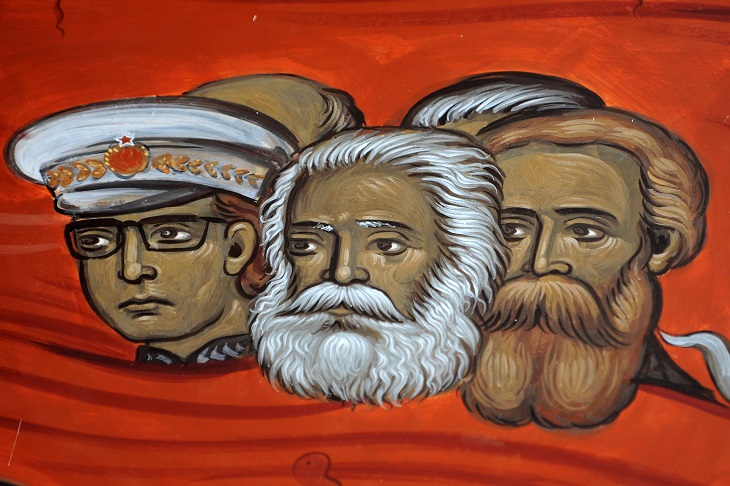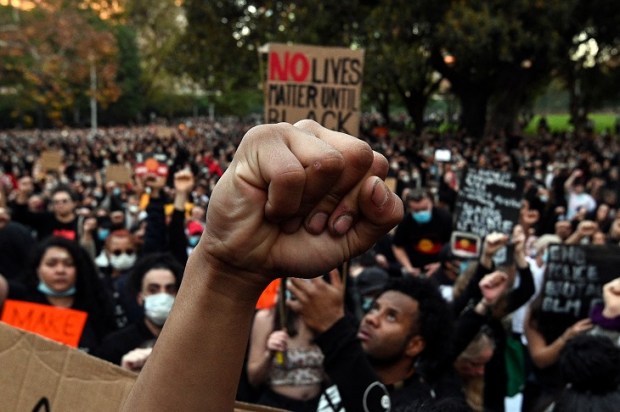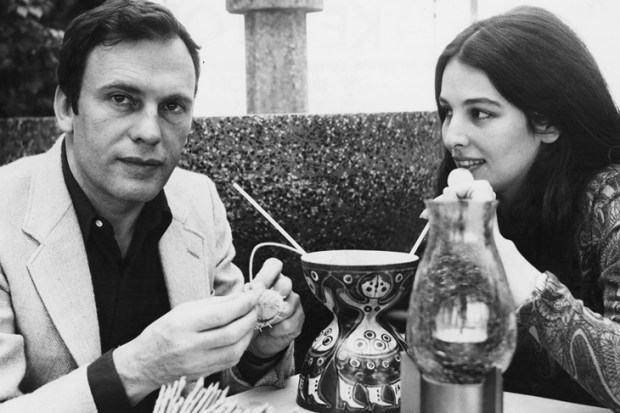‘Religion is the opium of the people,’ is the famous Karl Marx put-down, which he wrote in 1843 and which Christmas has smoked ever since.
Marxism is so yesterday. A throwback philosophy, so irrelevant to the 21st century. Still, the old political ideology is regurgitated by the likes of today’s BLM. (Susan Rosenberg, the director of the fundraising arm of Black Lives Matter, is a convicted Marxist terrorist, who was pardoned by Bill Clinton on his last day of office.)
And by the likes of the football code which fired Andrew Thorburn for things written a decade earlier by other people in his religion. Expensive opium…
Baby Karl Marx (hard to imagine such a creature) came into this world over 200 years ago (May 5, 1818 – the year Mary Shelley published Frankenstein). Marx died at age 65 (March 14, 1883).
‘The philosophers have only interpreted the world, in various ways. The point, however, is to change it.’ These words of his are inscribed on his tomb in Highgate Cemetery, London. If you believe that ‘context is truth’, look at the context.
That political imperative was framed in the 19th century, when the socio-political environment of Karl Marx was vastly different. Indeed, the world did change. Workers are no longer the chained victims of capitalist oppression … but victims there must be, or Marxism withers. So victimhood is re-introduced, re-defined, expanded, inclusive even…
Clearly, Marx didn’t formulate the Communist Manifesto in a vacuum. He perceived a need to change the world around him. And he wasn’t the only one. It was published when he was 30, in 1848, a year full of upheavals: a series of republican revolts against European monarchies, beginning in Sicily and spreading to France, Germany, Italy, Poland, and the Kingdom of Hungary (against the Austrian empire). They all ended in failure and repression, to be followed by widespread disillusionment among the Left. It was a world that needed to change, a world structured on class and privilege.
Indeed, life for most European people in the 19th century of Karl Marx was awful. For example, at least 80 per cent of the population in England was working class. Hard work, low pay, lack of security, and nothing like a fair go … this was the context in which the socialist/communist ideas were forged. No welfare safety net, no health insurance, no childcare subsidy, no air-con, no fridge, no TV, no pension plan, no holidays in Spain… He lived in the age of Charles Dickens.
Consider the circumstances that prompted a succession of laws on child labour, the Factory Acts, which were passed in the UK in 1833, 15 years before Marx published his Manifesto. Children younger than 9 were no longer allowed to work, those aged 9–16 could work 12 hours per day per the Cotton Mills Act. In 1856 (Marx was 38), the law permitted child labour past age 9, for 60 hours per week, night or day. It wasn’t until 1901 that the permissible child labour age was raised to 12. How enlightened…
Enlightened free market capitalism in the West has removed the chains of oppression – but not, ironically enough, in communist China and North Korea.
Marx aimed to explain the economic impact of capitalist society, where a small group, which he called the bourgeoisie, owned the means of production and used their power to exploit the proletariat, the working class that produced the goods that enriched the capitalists. Today, it is Woke Marxist corporates who play the role of the old bourgeoisie.
Under socialism, society would be governed by the working class in what he called the ‘dictatorship of the proletariat’. (The dictatorship idea remains attractive to socialists…) He believed that socialism would eventually be replaced by a stateless, classless society called communism. His ideological descendants now want a stateless world in which ‘you will own nothing and you’ll be happy’. (Note it’s you who will own nothing…)
As the need for Marxist solutions receded as a societal goal, racism receded, too, so that by the time (2020) Douglas Murray wrote The Madness of Crowds – gender, race, identity (Bloomsbury), he could wonder at the mad irony of the ghosts of racism haunting the public square, their old manifestations dragged about the streets by activists, just when these curses had been largely defeated. Zombie Marxism, Zombie racism, perhaps?
He wrote:
‘One of the traits of Marxist thinkers has always been that they do not stumble or self-question in the face of contradiction, as anybody aiming at truth might. Marxists have always rushed towards contradiction. The Hegelian dialectic only advances by means of contradiction and therefore all the complexities – one might say absurdities – met along the way are welcomed and almost embraced as though they were helpful, rather than troubling, to the cause. Anybody hoping that intersectionality would dissolve amid its own inherent contradictions cannot have seen the myriad of contradictions a Marxist can hold in their head at any one time.’
That’s the attraction, perhaps.
‘The number of Americans who view racism as a “big problem” doubled between 2011 and 2017,’ writes Murray. ‘At the exact moment that racism had never been more discredited or more socially and politically unacceptable, it is portrayed as omnipresent and needing a great pushback. (Equally applicable in Australia.) Having begun to view everything through the new lenses we have been provided with, everything is then weaponised, with consequences that are deranged as well as dementing. It is why The New York Times decides to run a piece by a black author with the title: Can my Children be Friends with White People?
‘And why even a piece about cycling deaths in London written by a woman can be framed through the headline: Roads Designed by Men are Killing Women. Such rhetoric exacerbates any existing divisions and each time creates a number of new ones. And for what purpose? Rather than showing how we can all get along better, the lessons of the last decade appear to be exacerbating a sense that in fact we aren’t very good at living with each other.’
But where would we be if Marxists weren’t trying to drag us back to the darkness and bitterness of their founder’s era? And as Martin Luther King Jr (1929 – 1968) warned, ‘Let us not seek to satisfy our thirst for freedom by drinking from the cup of bitterness and hatred.’
Got something to add? Join the discussion and comment below.
Get 10 issues for just $10
Subscribe to The Spectator Australia today for the next 10 magazine issues, plus full online access, for just $10.


























Comments
Don't miss out
Join the conversation with other Spectator Australia readers. Subscribe to leave a comment.
SUBSCRIBEAlready a subscriber? Log in